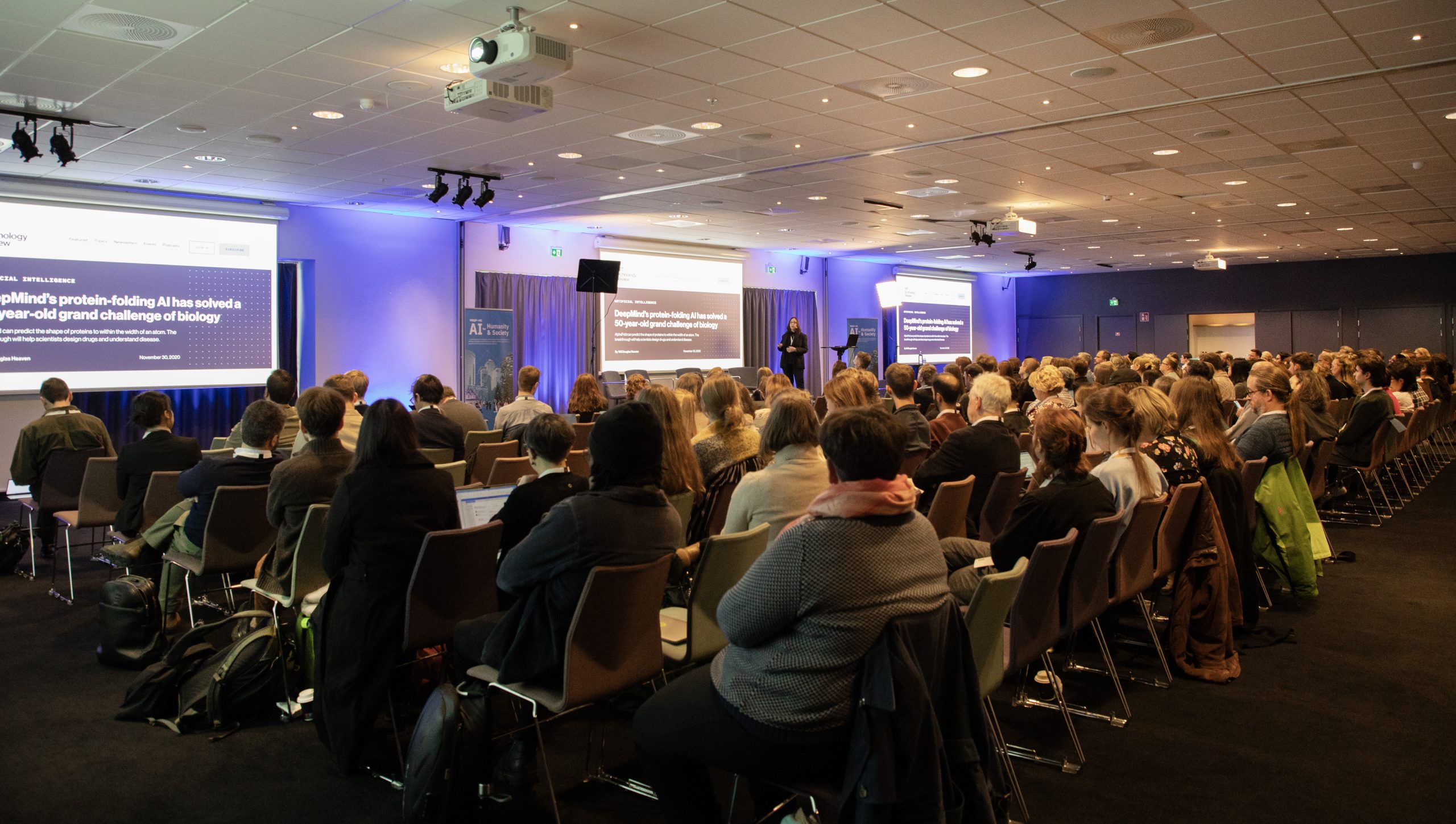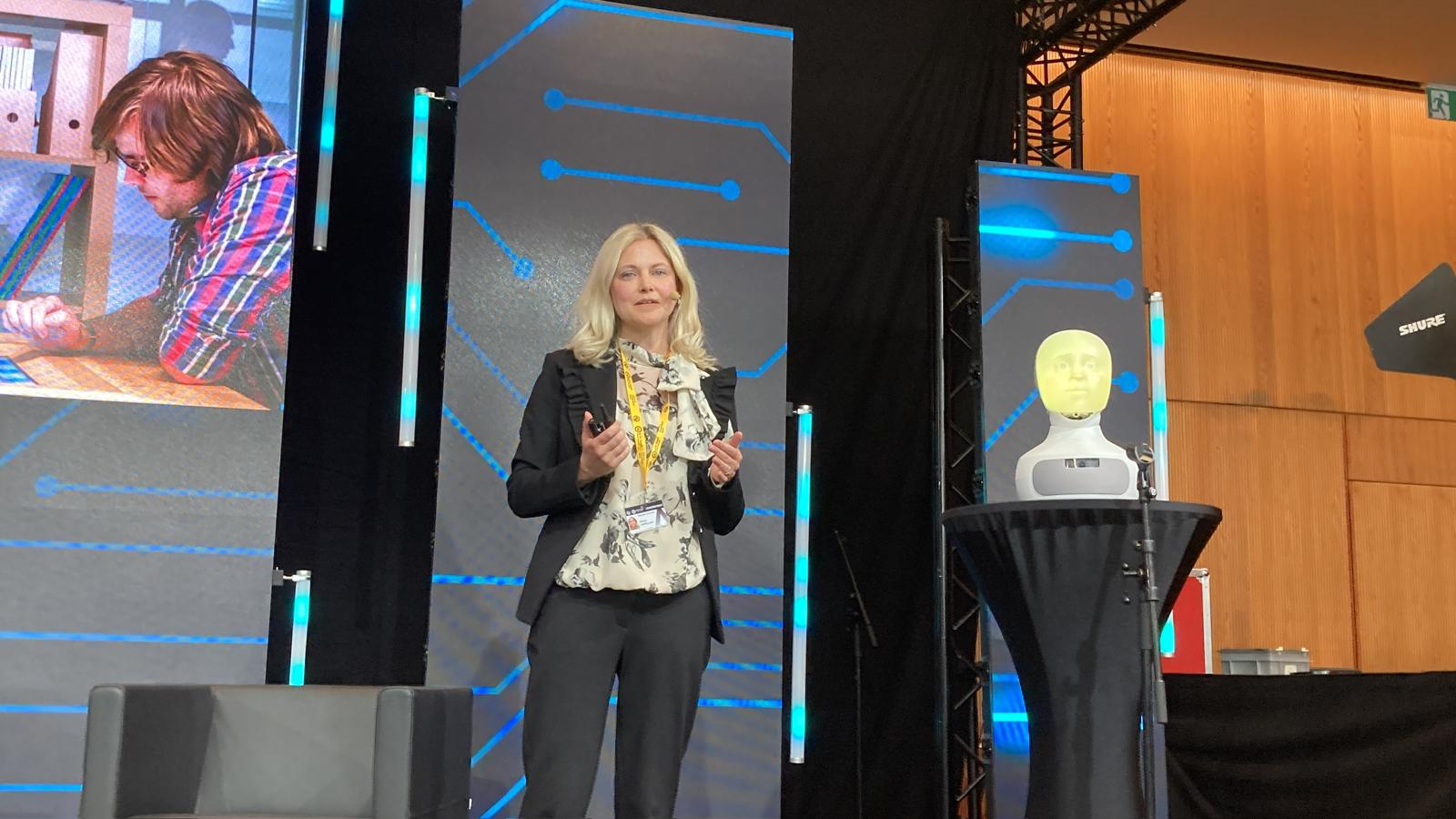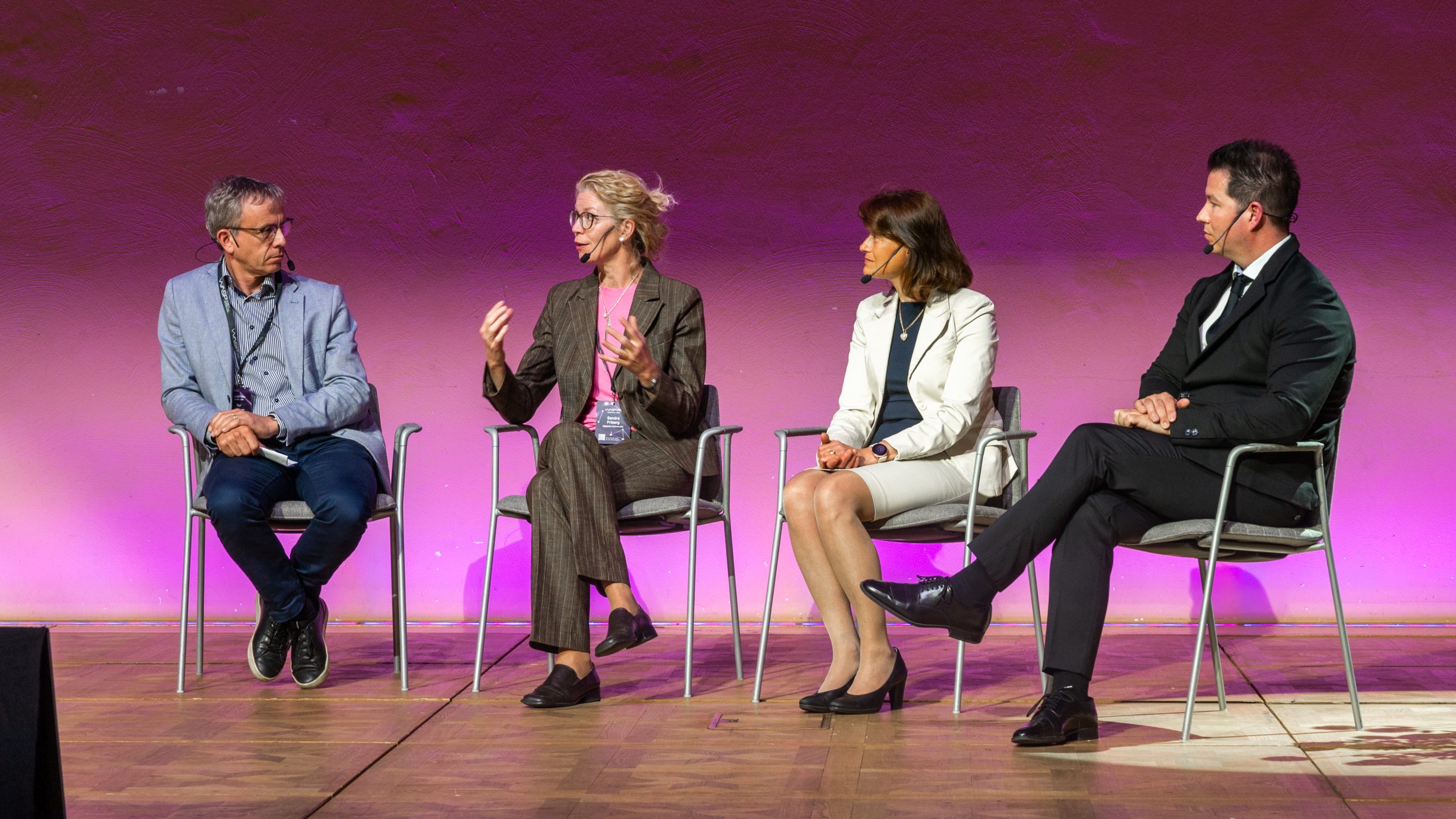Over 250 researchers and business representatives had registered for the AI for Humanity and Society 2023 conference at Malmö Live. The two-day conference was filled with international keynote speakers, thought provoking panel discussions and productive workshops.
“Living with AI – Critical Questions for Humanities and Social Sciences” was the theme of this year’s AI for Humanity and Society conference set by the conference chairs Stefan Larsson, Associate Professor in Technology and Social Change at Lund University, and Teresa Cerratto Pargman, Professor in Human-Computer Interaction at Stockholm University. The conference hosted leading international researchers and business representatives from all across Europe, including Germany, Portugal, The Netherlands and Norway, at Malmö Live and Malmö University in Malmö.
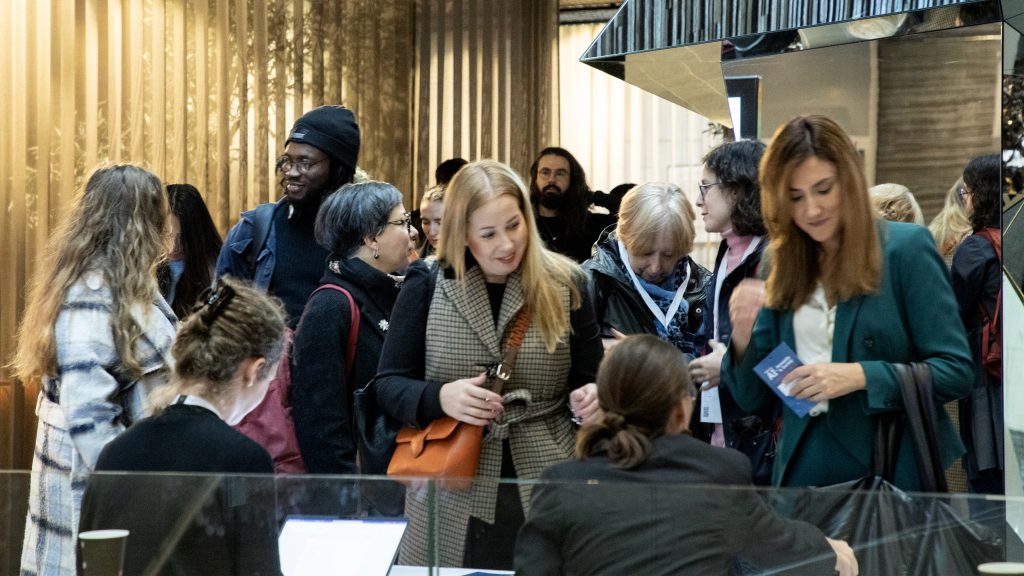
The two-day event started with a warm welcome by moderator Lisa Kirsebom, followed by Kerstin Tham, Vice-Chancellor at Malmö University and Professor in Occupational Therapy, and an introduction to WASP-HS (Wallenberg AI, Autonomous Systems and Software Program – Humanities and Society) by Helena Lindgren, WASP-HS Acting Program Director, and Professor at the Department of Computing Science at Umeå University.
The conference thereafter had a clear structure with three insightful keynotes which all served as the starting point for three food-for-thought panel discussions. In conjunction with the conference, WASP-HS also arranged seven successful workshops with topics ranging from AI in heritage collections and fictional news articles, to AI in education and surveillance.
The Influence of AI Metaphors and the Diversity of Criticality
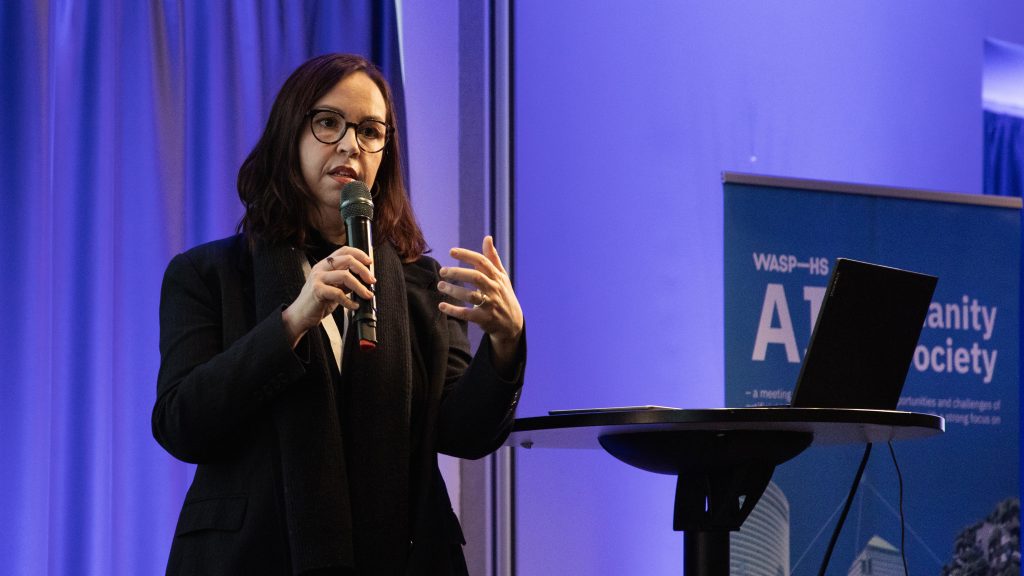
Photo: Charlotte Bärg
Shannon Vallor, Professor in the Ethics of Data and AI, at the University of Edinburgh, gave a keynote speech about human prediction and reflection in AI.
“The metaphors that we use to understand what AI technologies do, matter a great deal and some of the metaphors that we are often encouraged to use can mislead and obscure the reality of AI technology more than illuminate it” says Shannon Vallor.
The keynote emphasized that the power and capabilities of AI reflect human abilities, cautioning against the misleading notion of a human vs. machine conflict. This perspective seeks to prevent a misrepresentation of AI technologies and holds humans accountable for their impact. Recognizing AI as an extension of human power, values, and capabilities is crucial for responsibly shaping the trajectory and application of these technologies.
The keynote by Professor Shannon Vallor was followed by a paneldiscussion on criticality and AI studies with Airi Lampinen, Associate Professor in Human-Computer Interaction, at Stockholm University, Amanda Lagerkvist, Professor of Media and Communication Studies at Uppsala University, and Michael Strange, Associate Professor in International Relations at Malmö University.
“The panelists highlighted that criticality in social sciences and humanities is diverse, generative, and engaging. Rather than criticality being perceived as conversation inhibitors or inherently negative, they demonstrated the enriching possibilities of criticality,” states Katherine Harrison, Associate Professor at the Department of Thematic Studies at Linköping University and panel moderator.
Further discussed was how important it is to support and educate people in developing more nuanced understandings of what is at stake in the various manifestations of AI. Many of the panel comments also circled around identifying absences in the current hype and how alternative ways of talking and thinking about AI might be developed.
Humanizing Law in a Digital World and Norms, Assumptions and Values of AI
The second keynote of the day was given by Sofia Ranchordas, WASP-HS Guest Professor in Sociology of Law at Lund University, who spoke about how to be human again in the administrative state.
“Law is originally designed for human-to-human interaction and not human to computer interaction, and this can make the protection of citizens difficult. There is a gap between what the law aims to protect and how the law works in practice”, says Sofia Ranchordas.
Ranchordas further argues that we keep automatizing the procedures of law to save money, but as we do so, minorities and already vulnerable groups are affected negatively as they are not as strongly represented as others in the datasets that are provided for the automatization systems.
After the keyote, Martin Ebers, WASP-HS Guest Professor at Örebro University, Katja De Vries, Assistant Professor in Public Law at Uppsala University, Katie Winkle, Assistant Professor in Social Robotics at Uppsala University, Martin Berg, Professor of Media Technology at Malmö University, participated in the panel discussions on norms, assumptions, and values moderated by Stefan Larsson, Associate Professor in Technology and Social Change at Lund University.
Learning From AI Artists and Interdisciplinarity
The second day of the conference started with a keynote from Sarah Cook, WASP-HS Guest Professor in Art and AI at Umeå University. Professor Sarah Cook spoke about what we can learn about a world with AI by looking at what artists are doing with information systems. She argued that artists are researchers, and their research crosses multiple disciplines and work together with members of the community to produce new things.
“AI and other technologies pose both challenges and solutions. To navigate their complexity, diverse viewpoints—especially from artists, are crucial for addressing societal questions arising from technological development,” says Sarah Cook.
The third panel discussion was on methods and interdisciplinarity, and featured Irina Shklovski, Guest Professor of Communication and Computing at Linköping University, Barry Brown Professor of Human-Computer Interaction at Stockholm University, Anne Kaun, Professor in Media and Communication Studies at Södertörn University and Kivanç Tatar, Assistant Professor in Interaction Design at Chalmers University of Technology, recruited WASP-HS faculty. The panel discussion was moderated by Teresa Cerratto Pargman, Professor in Human-Computer Interaction at Stockholm University.
Productive Workshops
In conjunction with the conference, WASP-HS facilitated seven productive workshops at Malmö University.
“After the initial call, we received many excellent proposals. Ultimately, seven workshops took place with 99 participants coming from a variety of different backgrounds and disciplines” says Liane Colonna, Assistant Professor in Law and Information Technology at the Stockholm University and workshop chair.
The workshops covered a broad range of topics that addressed the social and ethical issues related to the development and deployment of AI.
“Overall, the workshops created a space for informed and critical discussions as well as fostering collaboration within the vibrant WASP-HS community” adds Donal Casey, Assistant Professor in Commercial Law at Uppsala University and workshop chair.
The themes of the seven workshops were:
- AI and Heritage Collections: Exploring Challenges and Opportunities
- Fictional News Articles: Ethics, Sustainability, and Politics of AI Futures
- Knowledge Elicitation: Data Collection and Knowledge Modeling for Human-Aware Systems
- Living with AI in Education – Mapping Future Pathways
- Reconfiguring the Mold: Behavior Science and Ethical Tech Culture
- The ‘Surveillant Assemblage’ in the Age of AI
- Towards Making the Intangible Tangible: Perspectives on Trust and AI
“We have discussed different methods of capturing and modeling knowledge, including developing ontologies through qualitative data analysis, using human-robot teams to learn personalized robot behaviors, employing participant voting for consensus-building in data, and exploring a feminist framework for knowledge elicitation. We hope that this workshop can contribute as a starting point for future events focused on exploring knowledge elicitation methods for human-aware systems” says Andreas Brännström, PhD student at the Department of Computing Science at Umeå University and chair of the workshop “Knowledge Elicitation: Data Collection and Knowledge Modeling for Human-Aware Systems”.
The Obligation to Engage
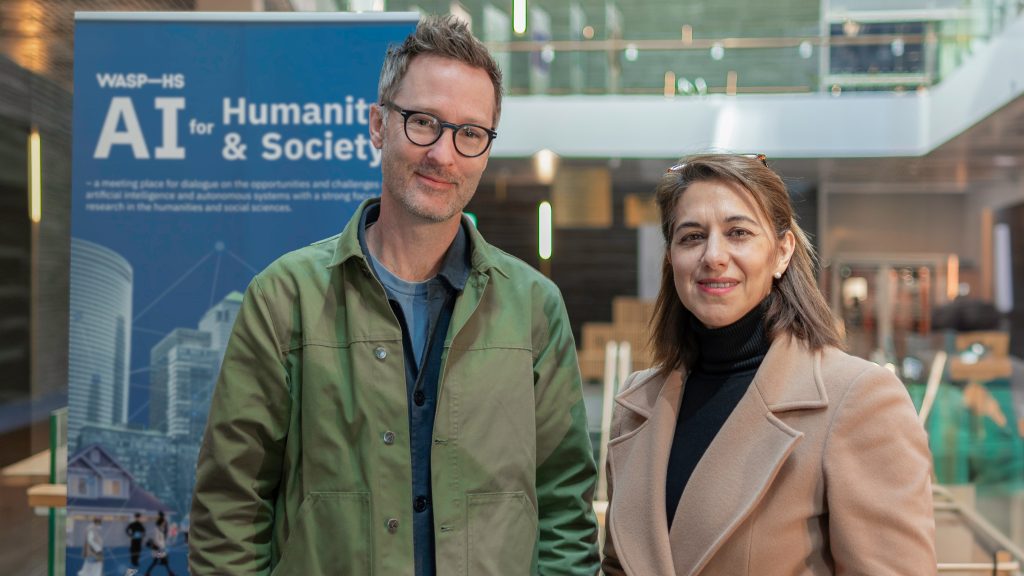
“During the conference we touched upon how the world is changing and that we live in a formative period with regulatory issues, as well as societal impacts of — for instance — generative AI. We have had keynotes exemplifying how agencies are calling for help and seen examples of how AI can have vast negative consequences on society. This shows how we have a role, and that we need to — and have an obligation to — engage”, concludes Stefan Larsson.

